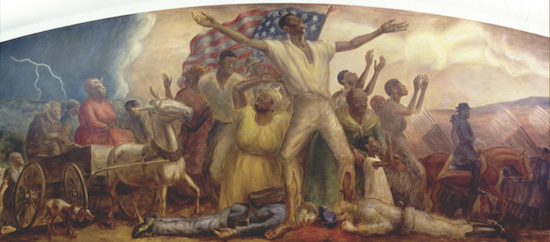
John Steuart Curry’s mural “The Freeing of the Slaves” in the UW Law School portrays the slaves themselves as drivers of their emancipation, says history Professor Steve Kantrowitz.
With a sweep of his pen, Abraham Lincoln changed the lives of 4 million black Americans when he signed the Emancipation Proclamation that led to the 13th Amendment outlawing slavery in the United States. But a striking, often-overlooked campus mural by John Steuart Curry tells a part of the story that’s often forgotten. (Read the full story.)
“The Freeing of the Slaves” adorns the north Reading Room wall of the UW Law Library on Bascom Hill. The central figure — a black man with arms upheld — is almost 11 feet tall. At his feet lie two soldiers: one Confederate, one Union. Recently-freed slaves crowd around, while in the background the Union army marches off victorious, in perfect formation.
On Nov. 8, UW-Madison history professor Steve Kantrowitz will be a featured guest at the Wisconsin Book Festival, discussing his new book, “More Than Freedom: Fighting for Black Citizenship in a White Republic, 1829-1889,” along with independent historian David Cecelski, author of “The Fire of Freedom: Abraham Galloway and the Slaves’ Civil War.” Kantrowitz’s book focuses on black reformers in the city of Boston — some of them former slaves — who fiercely challenged whites to recognize them as equal participants in American life.
“Emancipations,” a yearlong series of talks conceived by Kantrowitz and cosponsored by the Center for the Humanities (along with other campus partners), delves deep into the events leading up to the freeing of the slaves, as well as the struggles that followed. In free public talks across campus, visiting historians will address many topics, including the role of fugitive slaves and northern black abolitionists, the post-Civil War chaos that created conditions of unimaginable difficulty for newly freed slaves, and the long-term legacies of slavery, including contemporary mass incarceration of African-Americans.